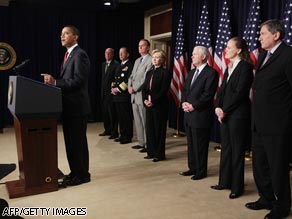
President Obama’s unveiling Friday of a new U.S. strategy in Afghanistan and Pakistan was made only after a thorough interagency review of the region with input from several sources, administration officials said.
“The president wants to make sure that this mission has a focus and a clear, concise goal,” said Bruce Riedel, who served as chairman of the review. “And that goal, as he spelled it out, is to disrupt, dismantle and defeat al Qaeda, and to ensure that their safe havens in Afghanistan and Pakistan cannot threaten the United States anymore.” Riedel said al Qaeda has regenerated over the past seven years, “and it is again a threat to the United States homeland and to American influence around the world and to our allies around the world.” Earlier Friday, Obama said that his plan called for more 4,000 more troops, new legislation, improved troop training and added civilian expertise to defeat the “terrorists who planned and supported the 9/11 attacks.” Riedel told reporters the review had been a “very intense and ambitious and aggressive 60-day effort to reach out and to make sure that we’ve gotten everyone’s views into it.” Riedel, co-chairman Richard Holbrooke and co-chairwoman Michelle Flournoy said the White House last month hosted separate delegations from Afghanistan and Pakistan for intense conversations regarding U.S. policy in the region. Secretary of State Hillary Clinton later hosted trilateral talks with representatives of both countries, they said.
Don’t Miss
Obama turns attention to Pakistan, Afghanistan
Obama adviser: Intel lacking in Afghanistan
Russia ready to help bring peace to Afghanistan
Commentary: Pakistan the weak link in plan
In addition, Vice President Joe Biden traveled twice to Europe to meet with NATO members and leaders in Brussels. Riedel said Obama’s aim was to ensure that U.S. planners set clear, concise goals for what they want to accomplish in the region. Together, Pakistan and Afghanistan represent a single region and a single challenge for U.S. policy, said Riedel, a former CIA officer. Part of the U.S. strategy is to “engage intensively with the Pakistan government” economically. “We’re also looking at what we can do on the military side,” he said. Efforts in Afghanistan will be made militarily and through civilian support, followed by “very intensive regional diplomacy,” Riedel said. U.S. troops can depart Afghanistan “as the Afghans can deal with their own security problems,” he said. He said he hoped the “synergy” from aggressive military action in Afghanistan and economic support in Pakistan would lead to the destruction of terrorist safe havens in the region. Holbrooke said Afghan President Hamid Karzai had watched Obama’s speech on television in Kabul “and was extremely grateful and will give his statement of support soon.” But in a rare official U.S. acknowledgment of the widespread corruption in Afghanistan, he likened it to “a cancer eating away at the country” and said, “It has to be dealt with.” As for Afghanistan’s planned election in August, Riedel said the United States “will neither support nor oppose any candidate.” He added, “We believe the election should be free, fair, open, and the candidates should operate from a level playing field.” Intense diplomacy will follow in coming weeks, with Obama headed to the NATO summit next week in Strasbourg, France, to meet with U.S. allies, and Clinton to The Hague on March 21 to attend a U.N. meeting. Holbrooke said the United States has received commitments from “many countries” to contribute troops during Afghanistan’s election. He said even more countries have agreed to help train Afghan troops and police. One big promise came from Japan, which has agreed to pay the salary of Afghanistan’s national police for the next six months, a “huge” commitment, Holbrooke said. Watch Obama’s news conference » The officials said success in Afghanistan would be determined based on the levels of violence, casualties, suicide bombings and moves against corruption. But Riedel said the benchmarks and strategy needed to be flexible. For that same reason, he said, no timeline has been set.
Asked whether Obama would move on actionable intelligence without Pakistan’s approval if the United States were to find a high-value target like al Qaeda mastermind Osama bin Laden in the country, Holbrooke stopped cold. “I just don’t think we can answer that question,” he said. “It’s speculative, it’s hypothetical, and it would be deeply injurious to our national interest to speculate.” He noted that the United States is but one of many countries with a stake in bringing peace to the region. He cited Saudi Arabia, Turkey, China, Russia, Iran, UAE and Afghanistan’s neighbors. “All those who have a real influence, all involved [with Afghanistan and Pakistan] whether we like it or not,” Holbrooke said.
